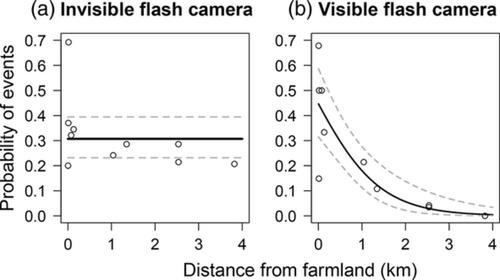当前位置:
X-MOL 学术
›
Ecol. Res.
›
论文详情
Our official English website, www.x-mol.net, welcomes your
feedback! (Note: you will need to create a separate account there.)
Geographical personality gradient in herbivorous animals: Implications for selective culling to reduce crop damage
Ecological Research ( IF 1.7 ) Pub Date : 2020-11-16 , DOI: 10.1111/1440-1703.12186 Takeshi Honda 1
Ecological Research ( IF 1.7 ) Pub Date : 2020-11-16 , DOI: 10.1111/1440-1703.12186 Takeshi Honda 1
Affiliation

|
Traditional lethal techniques used to mitigate wildlife damage have targeted entire populations through the use of random harvesting. However, recent literature has suggested that controlling population size by random harvesting is not the only mean to mitigate human‐wildlife conflicts. Controlling problem individuals may also be important because individuals with behavioral characteristics such as greater boldness and low neophobia are predicted to cause more damage to crops. Reducing the number of bold individuals may therefore mitigate crop damage, but a method to selectively cull bold individuals has not been determined. Hence, this study aimed to demonstrate their distribution in native habitats because if bold and shy individuals prefer different habitats, selective culling could target areas preferred by bold individuals. To detect differences in neophobia (i.e., shyness/boldness), 17 visible flash and invisible infrared flash sensor cameras were randomly placed in forest areas based on the assumption that neophobic (shy) sika deer (Cervus nippon) would be deterred by visible flash cameras (a novel stimulus). The relationship between camera flash type and the probability of detection (i.e., of being photographed by a camera) was used as an index of shyness/boldness. Geographical information system and regression analyses showed that bold individuals preferred forested areas near farmland. These results indicate that selective lethal control could be conducted in forest areas near farmlands to mitigate crop damage.
中文翻译:

食草动物的地理人格梯度:选择性剔除以减少农作物损害的意义
用于减轻野生动植物破坏的传统致死技术通过使用随机收获针对整个种群。但是,最近的文献表明,通过随机收获控制种群数量并不是减轻人类与野生动物冲突的唯一手段。控制有问题的个体也可能很重要,因为据预测,行为特征(例如更大胆和低恐新症)的个体会对农作物造成更多损害。减少大胆个体的数量因此可以减轻农作物的损害,但是还没有确定选择性剔除大胆个体的方法。因此,本研究旨在证明它们在本地生境中的分布,因为如果胆大的人和害羞的人更喜欢不同的生境,则选择性淘汰可能会针对胆大的人所偏爱的地区。可见的照相机会阻止日本的颈鹿(一种新颖的刺激)。相机闪光灯的类型和检测到的概率(即被相机拍摄)之间的关系被用作害羞/大胆的指标。地理信息系统和回归分析表明,大胆的个体更喜欢农田附近的森林地区。这些结果表明,可以在农田附近的森林地区进行选择性的致死控制,以减轻农作物的损害。
更新日期:2021-01-13
中文翻译:

食草动物的地理人格梯度:选择性剔除以减少农作物损害的意义
用于减轻野生动植物破坏的传统致死技术通过使用随机收获针对整个种群。但是,最近的文献表明,通过随机收获控制种群数量并不是减轻人类与野生动物冲突的唯一手段。控制有问题的个体也可能很重要,因为据预测,行为特征(例如更大胆和低恐新症)的个体会对农作物造成更多损害。减少大胆个体的数量因此可以减轻农作物的损害,但是还没有确定选择性剔除大胆个体的方法。因此,本研究旨在证明它们在本地生境中的分布,因为如果胆大的人和害羞的人更喜欢不同的生境,则选择性淘汰可能会针对胆大的人所偏爱的地区。可见的照相机会阻止日本的颈鹿(一种新颖的刺激)。相机闪光灯的类型和检测到的概率(即被相机拍摄)之间的关系被用作害羞/大胆的指标。地理信息系统和回归分析表明,大胆的个体更喜欢农田附近的森林地区。这些结果表明,可以在农田附近的森林地区进行选择性的致死控制,以减轻农作物的损害。











































 京公网安备 11010802027423号
京公网安备 11010802027423号